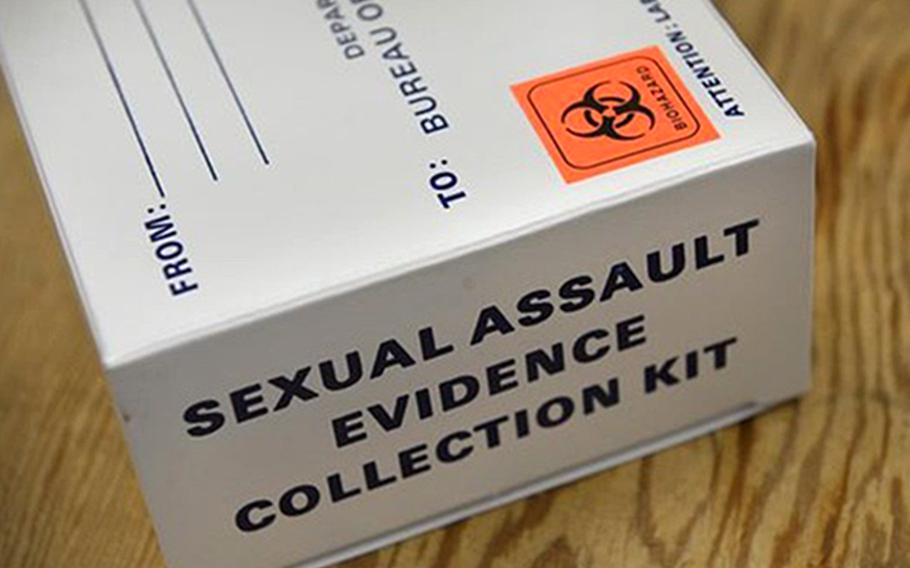
Defense Department civilian employees and contractors working abroad cannot get rape test kits done at military medical facilities, the Military Health System said in a memo dated March 13, 2025. Attorneys say that could create evidentiary issues in a sexual assault court-martial. (Rape, Abuse & Incest National Network)
KAISERSLAUTERN, Germany — Defense Department civilian employees and contractors abroad can no longer get rape test kits done at military medical facilities, a decision that attorneys say will likely make it easier to get some evidentiary exhibits levied against accused service members excluded at court-martial.
The Military Health System said the recently issued guidance is meant to clear up confusion around who can receive the forensic evidence collection tests under existing policy.
It requires non-Tricare beneficiaries, which would include most civilian workers who aren’t married to service members, to seek testing at foreign clinics, which may have different standards for processing evidence.
The March 13 memo from the assistant secretary of defense for health affairs states that military health care providers only can treat civilians who say they were sexually assaulted in emergency situations — where life, limb or eyesight are put at risk.
“Forensic healthcare examination or follow-up care is not included in the definition on limited emergency services,” the memo states.
The memo also says military facilities must establish a process that ensures non-Tricare beneficiaries are stabilized and transferred to a civilian facility should they request a forensic exam.
Regardless of eligibility, patients who seek care at military facilities after interpersonal violence should be treated as emergencies, the memo said.
About 35,000 civilian employees support 172,000 active-duty service members stationed overseas, according to Defense Department data from December 2024, with the largest civilian populations living in Germany, Japan and South Korea.
Proper evidence collection can be an important part of a victim’s legal argument in the event they accuse a service member of sexual assault and the case leads to a court-martial.
The U.S. military has detailed protocols for the handling of evidence after an assault allegation, including rules about the chain of custody. Outside the military, collection methods vary by country.
A foreign test kit may be easier to discredit in court compared with one collected on a U.S. base, said retired Lt. Col. Will Helixon, a former special victims prosecutor who now works as a civilian military defense lawyer in Wiesbaden, Germany.
“Any skilled defense lawyer is going to be able to ask the questions that would exclude a lot of that evidence,” Helixon said in an interview.
Some nations, particularly in parts of the Middle East and Africa, also view the concept of sexual assault very differently, which can dissuade victims from seeking help off base.
Defense Department employees already face challenges when it comes to accessing health care in their host nations.
Medical facilities overseas offer limited care for those who aren’t active-duty service members, providing care for a fee depending on capacity. Services offered can vary vastly from month to month.
In Japan, DOD-affiliated civilians and families cite language barriers, complex billing and differences in approach to care as common hurdles, according to a recent report from the U.S. Government Accountability Office.
Pete Kageleiry Jr., a retired lieutenant colonel and former judge advocate who now works as a private military defense lawyer in Virginia, said the memo raises questions about the reliability of evidence.
Kageleiry said that he has seen civilian employees receive test kits at military facilities. The memo is a step backward compared to recent improvements the military has made to its handling of sexual assault, and it’s likely to impact overseas cases, he said.
“I know from experience that these cases arise in every environment, like a contingency operation,” Kageleiry said. “There’s civilians with the force everywhere.”
Peter Graves, a spokesperson for the Military Health System, said forensic evidence collection policies were developed for the treatment of service members and their dependents, and do not include testing for people who are not insured by Tricare.
“There are significant gaps in policy and processes that contribute to risk, revictimization, and confusion when persons from outside the system present to (military health facilities) after a sexual assault,” Graves said in a statement. “This is compounded in overseas locations where host nations may not provide or recognize (sexual assault forensic exams).”
“The Department will continue to explore potential policy changes that mitigate risks associated with providing (such exams) to these persons,” Graves said.